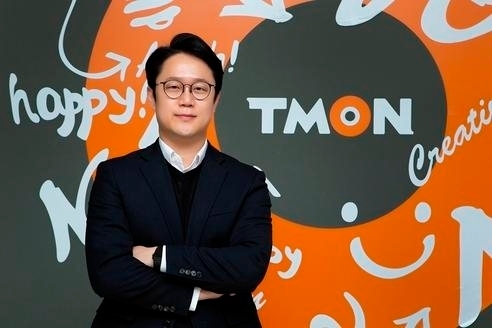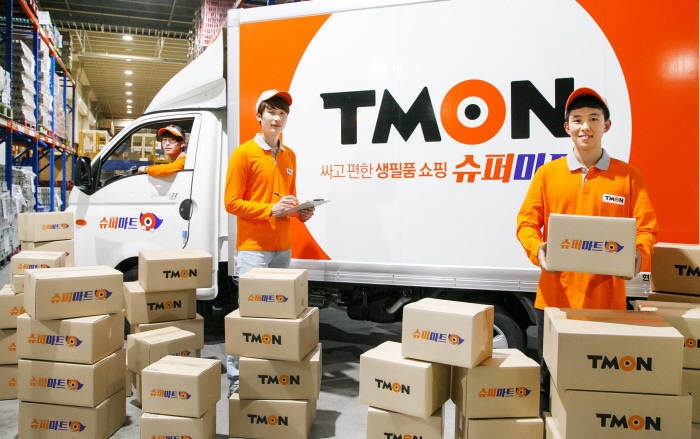Tmon undergoes makeover to pursue profit under new CEO
A year after CEO Lee Jin-won takes office, Tmon determined to turn profit
By Jo He-rimPublished : July 1, 2020 - 17:12

E-commerce is booming, particularly due to the pandemic. With just one click, customers can get almost anything they desire delivered to the doorstep within a day, or even hours.
Major e-commerce companies such as Coupang and Tmon are reportedly seeing their annual turnover pass over the trillion-won mark, and similar companies have been springing up, presenting new services that maximize consumers’ convenience.
But contrary to the attention these e-commerce firms are receiving, the industry has always been in chronic deficit. With most of them just around a decade old or younger, the focus is still on further expanding growth, rather than reaping the harvest.
That was how Tmon operated its business as well. Founded as the first social commerce provider here in May 2010, the company has been in the red all the years, just as were Coupang and WeMakePrice -- the two rivals that started in the same year with the same business model.
Since the new CEO Lee Jin-won took the helm in June 2019, however, Tmon has turned to profitability as its utmost goal, and is gearing up to go public early next year.
“Since Lee took office, the company has transformed. Not only the work atmosphere, but the company’s direction and business structure have changed completely,” a Tmon official said.
Tmon announced its first monthly operating profit of 160 million won ($130,000) in March, becoming the first among its rivals to go into the black. The company also cut its annual loss by half in 2019 from the previous year, to post a deficit of 75 billion won.
Time-commerce
With Lee in command, Tmon embraced a new identity as “time-commerce,” a concept introduced by the CEO.
Lee’s idea of time-commerce is that there will always be a discount offer, albeit for a limited time, when a shopper accesses its platform. In other words, discount promotions are running around-the-clock.
Flash deals or limited sales are not new concepts for retailers. But Lee says Tmon’s time-commerce is a new “genre.” He explains that these discount events are systematically organized to run consistently and regularly so that ultimately, there are always some products that are on discount.
For instance, its “100seconds time attack” store opens every 9 a.m. to offer items on discount for only 100 seconds, and the customer has to complete the shopping and payment within the time limit to get the deal. The strategy also works by instigating the shopper to visit and succeed in making the purchase.
Tmon says it currently has 35 such events running regularly, each of which the company labels as an individual store. All these stores, or deals, present the items at the cheapest prices without a delivery fee, Tmon explained.
Some stores are more popular than others. Tmon Black Deal, which introduces popular items every midnight, has accumulated more than 20 million orders in May, since its launch in November, Tmon said. While the store sells an average of 5 percent of all items sold on Tmon, its monthly sales are 15 times higher than other stores.
With the new strategy, Tmon said it is seeing an improved balance sheet. As of May, it has recorded a 187 percent increase in revenue, and a 217 percent increase in sales volume, compared to December 2018. The company also witnessed the number of its customers grow by 26 percent during the period.
Along with its time-focused deals, the company lopped off many of its small businesses and services that were once encouraged by Lee’s predecessors.

Tmon boldly shut down Supermart, its fresh food delivery service launched in 2015 and closed its distribution centers last year to cut the costs from direct buying. The company stopped its international shipping assistance service, and is also reducing its private brand business. Tmon launched its private brand 236:) in 2017, to start with daily necessities, such as tissues and fabric softeners and had expanded its product range to some 90 items encompassing food and clothes.
High discount rate is the key to Lee’s business strategy. Of all kinds shopping benefits sellers can offer, the benefit in price is what the customers like the most, Lee said in an interview last year.
And that was what has brought the young CEO to be in his position now. Lee, 41, started his career as a merchandizer at Gmarket, an open market platform operated by eBay Korea, in 2008. He then moved to Coupang in 2011, and organized a deep discount event there, which was the first by a social commerce company at the time.
Moving to WeMakePrice in 2016, Lee worked his way up to become the company’s vice president, before he was scouted by Tmon as chief operating officer in October 2018.
Goal to go public
Tmon now aims to go public by January or February next year, and has chosen local investment firm Mirae Asset Daewoo as its leading underwriter.
It is not the first time for Tmon to attempt to get listed. The company failed the first time in 2017, due to performance deterioration. Owned by Monster Holdings, the joint venture of two private equity funds Kohlberg Kravis Roberts and Anchor Equity Partners, Tmon was also involved rumors several times to be up for sale. Monster Holdings holds 98.38 percent of the company’s shares.
In marking the 10th anniversary of establishment, Lee vowed to make 2020 the first year for the company’s turnaround.
“The operating profit in March will not be a one-time event, but we will reinforce the business structure to make profits quarterly and annually,” Lee said.
“We will get rid of the negative label of chronic deficit, and raise the value of our company by being the first to make an operating profit in the industry.”
By Jo He-rim (herim@heraldcorp.com)












![[Today’s K-pop] BTS pop-up event to come to Seoul](http://res.heraldm.com/phpwas/restmb_idxmake.php?idx=644&simg=/content/image/2024/04/17/20240417050734_0.jpg&u=)





![[KH Explains] Hyundai's full hybrid edge to pay off amid slow transition to pure EVs](http://res.heraldm.com/phpwas/restmb_idxmake.php?idx=652&simg=/content/image/2024/04/18/20240418050645_0.jpg&u=20240418181020)

![[Today’s K-pop] Zico drops snippet of collaboration with Jennie](http://res.heraldm.com/phpwas/restmb_idxmake.php?idx=642&simg=/content/image/2024/04/18/20240418050702_0.jpg&u=)